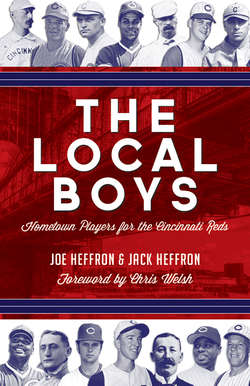Читать книгу The Local Boys - Joe Heffron - Страница 18
На сайте Литреса книга снята с продажи.
LARRY BENTON
ОглавлениеNOVEMBER 20, 1898–APRIL 3, 1953
Major League Career
1923–1935
Time as a Red
1930–1934
Position
PITCHER
“LUCKY LARRY” would have been a memorable nickname for Reds pitcher Larry Benton, but during his 13-year career he was never tagged with that moniker—mostly because he never had a whole lot of luck. He was born in Cincinnati, in the impoverished West End, but the family moved to St. Louis when he was still a child. Not long after the move, his mother died. According to his grandnephew Terry Lewnard, Larry’s father, unable to tend to three kids, sent them back to Cincinnati when Larry was around five years old to be raised by their maternal grandparents. Larry’s father remarried and moved, for his health, to Colorado. With as many as 11 people sharing a household, the family struggled financially, says Terry. Young Larry did whatever it took to survive.
Terry says that Benton was “kind of a high-strung, rebellious individual.” He learned the game on the sandlots of Cincinnati and played well enough to be signed by Portsmouth in the Virginia League at age 22. The powerful New York Giants grabbed him, but, just Larry’s luck, they traded him to the hapless Boston Braves, with whom he debuted in 1923. The Braves lost 100 games and finished seventh. The die for Benton’s career was cast. As Cincinnati Post sports columnist Pat Harmon noted a few days after Benton died, he had the misfortune to pitch six seasons for last-place teams and three seasons for teams that finished next to last. In 1925, on yet another weak Braves squad, Benton finished 14–7, leading the team in win percentage and ERA. Off to a good start the following year, he was traded back to the Giants and, for the first time, found himself in a fortunate situation.
He made the most of it, going 13–5 for the Giants and leading the National League in win percentage. The following year, he led the league again in that category, as well as in wins (25) and complete games (28). He was runner-up in innings pitched (310.1), which far exceeded what he’d pitched in previous seasons and likely led to arm problems. His career slowly went downhill from there. After struggling in 1929 and early in the next season, he was traded to the Reds, who gave up star second baseman Hughie Critz to the Giants. Reds owner Sidney Weil suffered serious losses in the stock market crash and dealt a number of his top players, leading to some of the worst years in franchise history. Larry Benton pitched through nearly five of them. Working in the rotation and in relief, he compiled a 33–52 record with the moribund Reds. He pitched strictly out of the bullpen his last year here, and then returned to the Braves for a final season, retiring at age 37.
Off the field, Benton courted the luck he lacked on it. “He lived the fast life,” recalls his nephew, Larry Lewnard, who noted that Benton was a flashy dresser who drove flashier cars. He counted among his friends some of the movers and shakers in the Newport nightlife scene. Nephew Larry recalls Benton, a long-time bachelor, marrying his wife, Ruth, in 1937 or ’38. The couple lived in an apartment in Westwood and had no children. She worked as an executive secretary in the office of Senator Robert A. Taft, while Benton got a job with the Cincinnati Transit Authority. But his bad luck continued when Ruth died of cancer in 1951. Two years later, while putting on the 14th hole at the Ridgewood Golf Club in Amberley Village, Benton told his friends, “I’ve got a hell of a crick in my neck” and dropped dead of a heart attack on the spot. An early, unfortunate end to a tough life. As grandnephew Terry phrased it: “Larry Benton was his own man who ran with the spirit of the way life took him.”
